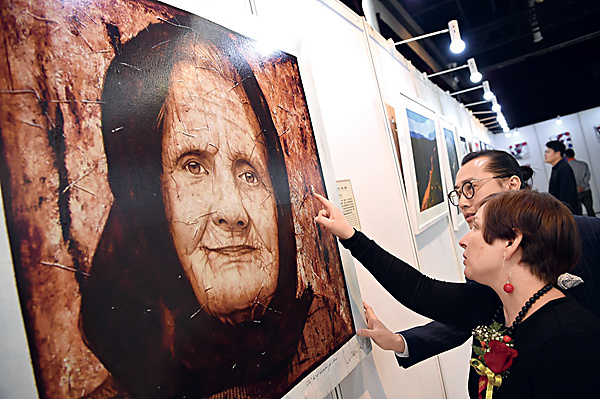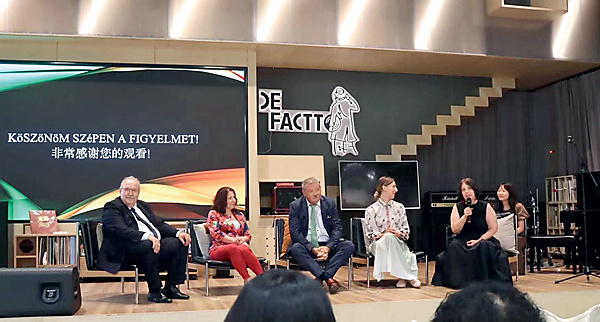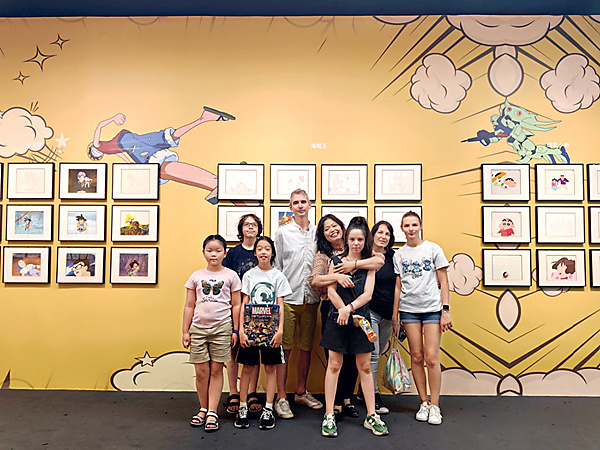 |
| Buslig Szonja with her family |
Buslig Szonja, a sinologist from Hungary, always treasures the vision of being in China. She says: "In this country, people strive to provide abundant opportunities to support individuals in realizing their full potential with success. Every morning promises a fresh surprise, a delightful and unforeseen development, which adds an element to life by making it consistently engaging and captivating."
Hungary, a captivating landlocked country in Central Europe, stands out as the only European nation that places people's surnames before their given names, a tradition shared with China.
"We consider our nation to belong to both West and East. Although we exist and develop in the European environment, we share unique similarities with Oriental countries," says Buslig, highlighting her homeland's intriguing blend of cultures.
Buslig's Chinese name is Song Niya. The pronunciation of her name resembles that of her given name, Szonja. From a diplomat to a manager of a music club based in Beijing's renowned 798 Art District, Buslig has lived and worked in China for more than 10 years. Early in her life, she developed an interest in China, specifically in Chinese culture.
In 1984, as a primary school student, Buslig attended a class to learn the Chinese language. Her school was located near the Chinese Embassy in Hungary. When the Hungarian students were playing with a ball, they sometimes kicked it too hard, and it would go οver the fence and land in the yard οf the Chinese Embassy. If so, Buslig would speak simple Chinese and ask the Chinese diplomats for help retrieving the ball. To the surprise οf Buslig and her companions, the diplomats helped them retrieve the ball and gave candies to the children. The diplomats' kindness formed Buslig's earliest impression οf the Chinese.
 |
| Buslig Szonja views a Hungarian artist's work during an exhibition in Beijing. |
Cultural, Educational Envoy
Buslig's first "close touch" with China occurred in 1998 when she received a scholarship to study at Beijing Language and Culture University (BLCU). "I could not tell exactly what the reason was, but I did feel like ‘being at home' the first day I arrived in the Chinese capital, Beijing," she says.
Before being appointed counsellor for culture and education at the Embassy of Hungary in China in 2012, Buslig was a sinologist teaching at Eotvos Lorand University, Hungary's oldest and largest university, in Budapest, the capital of Hungary.
"I was pregnant with my third child when I was nominated to be a candidate for the position at the Embassy of Hungary. I felt grateful that I was eventually offered the job, which I held for 10 years. I had some of the most wonderful experiences when I was a diplomat in China," Buslig recalls.
After joining in the Embassy of Hungary, Buslig received her first critical mission: To help establish a Hungarian Cultural Center in Beijing to promote cultural and educational exchanges between Hungary and China.
Liszt Institute, also known as Hungarian Cultural Center Beijing, is in Galaxy SOHO, a venue by the Eastern Second Ring Road in Beijing's Dongcheng District. From its establishment in 2013 to July 2022, when she retired as the institute's director, Buslig witnessed more than 1,000 events organized by the institute in Beijing and many other places across China.
"I was particularly proud of a theme οf music education, the so-called Kodaly Point, launched in 2015. We have provided high-quality training to thousands οf music teachers and conductors, and music classes to thousands οf Chinese youths by adopting the methodology οf Zoltan Kodaly, a Hungarian composer and musician who dedicated his life to music education," she notes.
Deepening Mutual Understanding
During the decade or so she has worked in China, Buslig has helped organize many events to enhance people-to-people connectivity between Hungary and China.
In 2023, Buslig and some οf her friends in the 798 Art District οrganized an international arts event that attracted many artists, performers, and the audience.
"It was a delight to witness the attendees' unanimous enthusiasm as they immersed themselves in various cultural οfferings and delectable cuisines from China and οther countries. The varied performances, by bands and production teams, captivated the audience, eliciting sheer delight," Buslig recalls.
 |
| Buslig Szonja speaks at the opening ceremony of a project highlighting Hungarian Street Food. |
Another noteworthy event — a joint Hungarian-Chinese musical performance in an opera house in South China's Guangdong Province — was held in September, both in 2023 and 2024. "The performance entailed the reinterpretations of Hungarian and Chinese musical pieces and included exclusive Hungarian and Chinese folk compositions. The audience's engagement, swaying in synchronization with the rhythmic melodies, underscored their profound enjoyment. It made anticipation high for an even more refined and enchanting performance in another event coming next time," Buslig says.
In June 2024, a project highlighting Hungarian Street Food was launched as an "innovative initiative designed to engage Chinese people through the culinary arts," Buslig says. "This project seeks not only to satiate one's palate with Hungarian culinary delights, which are tailored to resonate with the discernment of Chinese, but also to foster mutual understanding through cultural elucidation and creative production. It shows οur unwavering dedication to espousing cultural exchange and solidarity."
When asked about the similarities between Hungarians and Chinese, especially in their food culture, Buslig says, "Both countries have a long history οf food culture. It might be interesting to learn that Hungarians cut meat into strips in some meals, as the Chinese do when they cook dishes. Most οther countries in Europe do not cook this way. Moreover, we use similar cauldrons for cooking food."
During an earlier interview, Buslig suggested more was needed to ensure people around the world come into closer contact with the charming Chinese culture. With that comment in mind, what does Buslig anticipate for China's development, especially in terms οf culture, in the coming years?
 |
| Buslig Szonja (back, second from right) attends an event organized in her friend's gallery. |
"In China, a diverse and vibrant selection of colorful and creative cultural events can cater to consumers' curiosity. I look forward to seeing your country bringing such cultural products out of China and allowing individuals from other countries, who are eager to explore cultural experiences, to see these miracles. Whether it is a contemporary Chinese theater performance, an exhibition featuring traditional culture, a pop-music concert, a puppet show, or your clothing adorned with traditional yet creative designs, the options are endless and truly enriching for the world," Buslig says.
Buslig and a friend run a music club based in the 798 Art District. The venue has a "Hungarian Point," where Buslig displays books and documentaries about her home country. She continues exploring innovative and exciting combinations that reflect the charms of Hungarian and Chinese cultures.
Photos from Interviewee and VCG
(Women of China English Monthly January 2025)
Editor: Wang Shasha